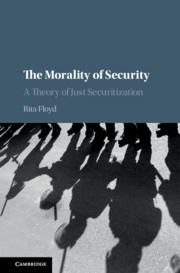Book contents
- The Morality of Security
- The Morality of Security
- Copyright page
- Dedication
- Contents
- Figures
- Acknowledgements
- Glossary
- Abbreviations
- Introduction
- 1 Ethics and the Study of Security
- 2 Framework: the Meaning of Securitization and the Method of JST
- 3 Just Initiation of Securitization: Just Reason
- 4 Just Initiation of Securitization: Just Referent Objects
- 5 Just Initiation of Securitization: Right Intention, Macro-Proportionality and Reasonable Chance of Success
- 6 Just Conduct in Securitization
- 7 Just Termination of Securitization
- Conclusion
- References
- Index
1 - Ethics and the Study of Security
Published online by Cambridge University Press: 19 April 2019
- The Morality of Security
- The Morality of Security
- Copyright page
- Dedication
- Contents
- Figures
- Acknowledgements
- Glossary
- Abbreviations
- Introduction
- 1 Ethics and the Study of Security
- 2 Framework: the Meaning of Securitization and the Method of JST
- 3 Just Initiation of Securitization: Just Reason
- 4 Just Initiation of Securitization: Just Referent Objects
- 5 Just Initiation of Securitization: Right Intention, Macro-Proportionality and Reasonable Chance of Success
- 6 Just Conduct in Securitization
- 7 Just Termination of Securitization
- Conclusion
- References
- Index
Summary
- Type
- Chapter
- Information
- The Morality of SecurityA Theory of Just Securitization, pp. 28 - 48Publisher: Cambridge University PressPrint publication year: 2019



